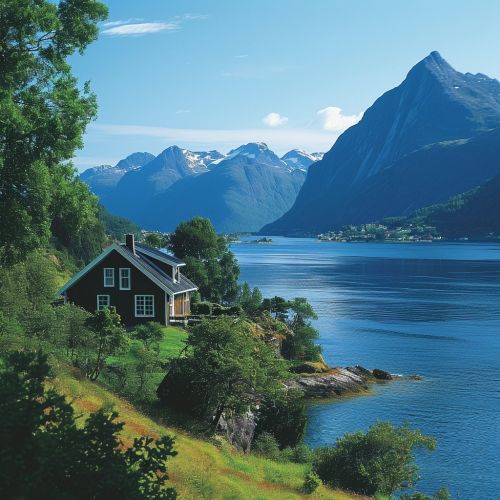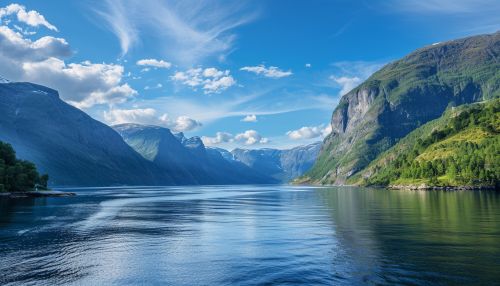Norway
Geography
Norway, officially known as the Kingdom of Norway, is a Nordic country located in Northern Europe. It is part of the Scandinavian Peninsula, sharing land borders with Sweden, Finland, and Russia. To the west and south, Norway is bordered by the North Sea and the Norwegian Sea. The country is known for its complex and varied topography, which is dominated by mountainous terrain and includes a long coastline punctuated by fjords.


Climate
Norway's climate is influenced by its latitude, topography, and coastal proximity. The country experiences a temperate coastal climate along the western and northern coasts, characterized by cool summers and mild winters. Inland areas and the far north have a continental climate, with colder winters and warmer summers. The Gulf Stream has a significant moderating effect on Norway's climate, particularly along the coast.
History
The history of Norway can be traced back to the migration of early humans into the region during the last Ice Age. The country has a rich historical tapestry that includes the Viking Age, the union with Denmark and later Sweden, and its eventual independence in 1905. Norway remained neutral during World War I but was occupied by Nazi Germany during World War II. Post-war Norway experienced rapid economic growth, largely due to its offshore oil and gas reserves.
Government and Politics
Norway is a constitutional monarchy with a parliamentary system of government. The Monarch of Norway is the ceremonial head of state, while the Prime Minister is the head of government. The country is known for its commitment to social democracy, human rights, and international peacekeeping efforts. It is a founding member of the United Nations, NATO, and the Council of Europe, and is also part of the European Economic Area and the Schengen Agreement.
Economy
Norway has a mixed economy with a combination of free market activity and significant government involvement. The country is rich in natural resources, including petroleum, hydropower, fish, forests, and minerals. Norway is one of the world's largest exporters of petroleum. Other key sectors of the economy include shipping, aquaculture, food processing, shipbuilding, pulp and paper products, metals, chemicals, and tourism.
Culture
Norwegian culture is rooted in its seafaring history and rural traditions. The country has made significant contributions to literature, music, and visual arts. The works of playwright Henrik Ibsen and novelist Knut Hamsun are internationally renowned. Norway is also known for its folk music and dance traditions, as well as modern music genres such as black metal. The country's cuisine is heavily influenced by its coastal geography, with seafood playing a prominent role.
Education and Science
Norway has a high standard of education and is home to several reputable universities and research institutions. The country has produced a number of notable scientists and inventors, including Fridtjof Nansen, Roald Amundsen, and Ivar Giaever. Norway is also known for its contributions to fields such as marine biology, petroleum geology, and climate research.
Sports
Norwegians have a strong affinity for outdoor activities and sports. Winter sports such as cross-country skiing, ski jumping, and biathlon are particularly popular. Norway has hosted the Winter Olympics twice and has won more Winter Olympic medals than any other country. Football, handball, and cycling are also popular sports in Norway.
